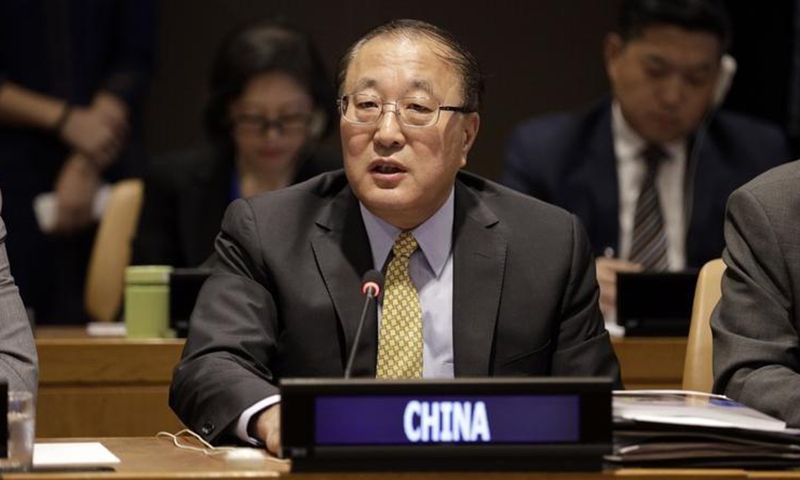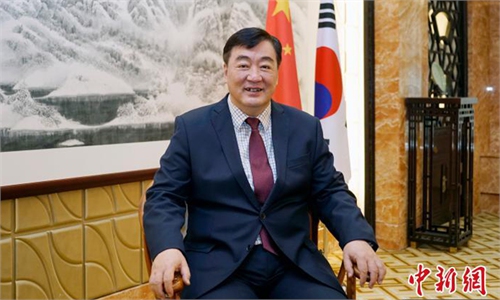No country can put up its own security fence at others’ doorstep: Chinese ambassador to UN

China's permanent representative to the UN Zhang Jun File photo: Xinhua
Respect for national sovereignty and territorial integrity, as set out as the important principle in the UN Charter, is the bedrock of contemporary international law and international relations, and a golden rule of state-to-state interactions, Zhang Jun, China's permanent representative to the United Nation (UN) said on Monday during a Security Council meeting.
Under the initiative of China as rotating presidency of the UN Security Council for August, the meeting on "Promote common security through dialogue and cooperation" was held on Monday, according to the official website of the Permanent Mission of China to the UN.
Respect for national sovereignty and territorial integrity, as set out as the important principle in the UN Charter, is the bedrock of contemporary international law and international relations. If this principle is ignored and abandoned, the whole system of international law will be shaken to its roots, the world will return to the law of the jungle, and common security will be totally out of the question, Zhang said.
"We must take an unequivocal stance in respecting the sovereignty and territorial integrity of all countries, respecting the development path and social system independently chosen by the people of each and every country, and respecting every country's effort to safeguard its unity and national solidarity," Zhang said. This must be a golden rule of state-to-state interactions, serving as the foundation and boundary for achieving common security, Zhang noted.
The "golden rule" should be universally applied and no double standards should be allowed, according to Zhang.
In this regard, there already are many lessons. Experiences in Afghanistan, Syria, and Iraq, among others, serve as a warning to us all the time that interfering in other countries' internal affairs under the pretext of counter-terrorism, democracy and human rights not only brings huge losses, harm and sufferings for the countries concerned, but also erodes the common values of mankind, such as democracy and freedom, and it undermines efforts for common security, rather than helping them, Zhang pointed out.
China always respects the sovereignty and territorial integrity of other countries, upholds international fairness and justice, and supports the efforts of the international community to achieve common security. "At the same time, China will take all measures to firmly safeguard its own sovereignty and territorial integrity."
Driven by the thinking of the so-called "strategic competition" among great powers, the global strategic security environment has continued to deteriorate. The international non-proliferation regime represented by the Treaty on the Non-Proliferation of Nuclear Weapons (NPT) is facing the most severe challenge since the end of the Cold War, Zhang said.
Countries with the largest nuclear arsenals should fulfill their special and priority responsibilities by further reducing their nuclear arsenals substantively and substantially in a verifiable, irreversible and legally-binding manner. This will create conditions for other nuclear weapons states to join the nuclear disarmament process, Zhang pointed out.
Leaders of the five Nuclear-Weapon states, namely China, France, Russia, Britain and the US in January issued a joint statement on preventing nuclear war and avoiding arms races, according to Xinhua News Agency.
"We affirm that a nuclear war cannot be won and must never be fought," said the joint statement.
This solemn commitment will help enhance mutual trust among major powers, prevent a nuclear war, and avoid an arms race which would plunge the world into greater calamities, said Zhang.
"China has been advocating the complete prohibition and thorough destruction of nuclear weapons, and has always adhered to the policy of 'no first use' of nuclear weapons at anytime and under any circumstances," Zhang pointed out.
And we have made a clear commitment unconditionally not to use or threaten to use nuclear weapons against non-nuclear weapon states or nuclear weapon free zones, said Zhang.
"China is the only country among the five nuclear weapon states that has made the above commitments," Zhang pointed out. Zhang also urged other nuclear weapons states to adopt the same policy to jointly safeguard global strategic stability and effectively reduce the risk of a nuclear war.
Zhang also said that it must be recognized that in the era of globalization, the world faces security and perils alike.
To realize its own security, no country can ignore the legitimate security concerns of other countries, nor can one build its own security based on the insecurity of others', or put up one's own security fence at others' doorstep, he noted.
"In the face of differences and conflicting interests, what we should do is to find the greatest common denominator through dialogue and cooperation and resolve disputes by peaceful means," Zhang said. "This is the only path to common security."
NATO's eastward expansion offers a profound lesson, Zhang stressed. Clinging to the cold war mentality, unilateralism, the zero-sum game or bloc confrontation politics will not only make it difficult to guarantee one's own long-term security, but will also lead to an escalation of crisis to the opposite of common security, Zhang said.

